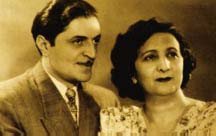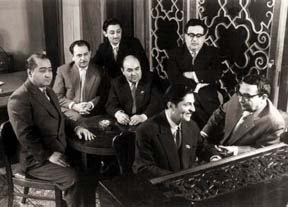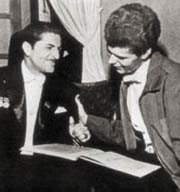|

Winter 1997 (5.4)
Pages
46-49
Niyazi Hajibeyov,
familiarly and affectionately known simply by his first name
"Niyazi" (pronounced nee-YAH-zee), is recognized as
Azerbaijan's greatest symphonic conductor. It was Niyazi who
first promoted the opera, ballet and symphonic works of many
Azerbaijani composers - Uzeyir Hajibeyov, Muslim Magomayev, Gara
Garayev, Fikrat Amirov, Arif Malikov and others-in the USSR and,
in some cases, even beyond. He was the first Azeri conductor
to gain international recognition.
The Home Museum
Not
long ago, I stopped by Niyazi's Home Museum in Baku. In Azerbaijan,
we're fond of transforming the former living spaces of our great
cultural heroes into national "home museums." And so
it is with Niyazi, whose museum was opened on "Music Day,"
September 18, 1994. There is no elevator in his apartment building
so I trudged up the three floors to the place I knew so well.
It had been quite some time since I had been there as Niyazi
had passed away 13 years ago.
I had barely entered the hallway when memories came flooding
over mememories of those unforgettable evenings that so many
of us had shared with him in his home. Slowly, I wandered through
the familiar five-rooms. How modest everything looked-so spartan.
But, it had always been that way. There was nothing expensive
on display-no china, no crystal or silver. The only objects of
value were the scores of photos gracing the walls, many of them
inscribed to Niyazi, showing him posing with other musicians.
  Left: Niyazi and his wife,
Hajar Left: Niyazi and his wife,
Hajar
As I continued
wandering through the apartment, a couple of times I had this
strange feeling that one of the doors might suddenly open and
Hajar Khanum, Niyazi's wife, would burst in, announcing, "Hey,
Prince! Look who's here!"
Of course, she
too has passed on [October 1990], but I rather enjoyed imagining
what it would be like if she really would have appeared. Of course,
she no longer would have been young, but, no doubt, her smiling
eyes and aura of graciousness would be the same as always. I
could imagine Niyazi following after her, his hands clutching
a musical score. And then Hajar Khanum would be busy herself
setting the table and spreading an array of food for the unexpected
guests.
Yes, that's exactly how it used to be in Niyazi's home. Wherever
they lived - Moscow, Istanbul or Baku-they always had guests
who stayed with them late into the night. In fact, one time I
asked Niyazi if they had ever spent an evening home alone. My
question seemed to offend him. "Thank God, No!" he
replied. "How could we live without friends?"
 |
 |
Left: Azeri composers with Niyazi: clockwise,
starting from the left: Jahangir Jahangirov, Tofig Guliyev, Azer
Rezayev, Sayid Rustamov, Soltan Hajibeyov, Gara Garayev and Niyazi
(1960). Courtesy of National Photo Archives.
Right: Niyazi with Van Cliburn who had performed
in Baku. Niyazi had conducted the orchestra (July 24, 1960).
As I gazed at
one of the photos of Hajar Khanum and Niyazi, it seemed as if
she wanted to speak. I let myself slip into an imaginary conversation
with her. I guess, in a sense, such reminiscence helps ease some
of the grief of having lost these dear friends.
In my imagination, I asked her how Niyazi had gotten involved
with music. It was almost as if I heard her voice reply. It seemed
she was eager to speak, as it had been so long since we had seen
each other. She told me how his career had unfolded.
An Amazing Career
"Niyazi
was born into an extraordinarily musical family. From his childhood,
he was surrounded by some of Azerbaijan's greatest musicians
and immersed in music. His father, Zulfugar Hajibeyov (1884-1950),
was one of the founders of the Musical Theater in Azerbaijan
And his uncle was none other than the great composer and founder
of Azerbaijan's classical movement, Uzeyir Hajibeyov (1885-1948).
The professional music school that he founded still stands today
as the highest pedagogical musical institute (the Academy of
Music). It was Uzeyir who introduced Niyazi to Azerbaijani folk
music and to the Western opera and symphonic works that the youth
learned to play on the piano and violin.
Niyazi was propelled into the musical limelight by an experience
in Moscow in 1938. It was during the height of Stalin's repression,
when one of the propaganda tools of the regime was to project
an image that all ethnic groups living in the Soviet Union were
getting along just fine as one big happy family. The Soviet government
held what they called "The Ten Year Festival of Azerbaijani
Arts." That year, Azerbaijanis planned to perform Uzeyir
Hajibeyov's operas, "Koroglu" (The Blind Man's Son,
composed in 1934), "Arshin Mal Alan" (The Cloth Peddler,
1913), as well as Muslim Magomayev's opera "Nargiz"
(1935).
It so happened that Uzeyir, who was supposed to conduct these
works, fell ill and called upon Niyazi to step in for him. Niyazi
was young at the time-only 26 years old. And, as Hajar Khanum
tells the story, he was terrified. Never had he conducted such
important works in front of such an audience. The event took
place in Moscow's most esteemed concert hall, the Bolshoi Theater.
Despite intense pressure, Niyazi successfully conducted all three
operas and, in the process, stole the hearts of many music lovers
that night. It turned out to be the beginning of a brilliant
career."
Hajar Khanum didn't seem to want to stop her narrative. She seemed
lonely. I was eager for her to continue. I had missed hearing
her voice these last few years. She began again.
"Niyazi had this incredible charisma that made people fall
in love with him. Audiences were mesmerized with his sense of
rhythm, the fluidity of his music and his great passion. While
conducting, he rarely glanced at the musical score because he
knew the pieces so well."
Hajar Khanum
recalled how Niyazi used to turn and bow to the audience after
finishing a piece and how, after flipping back the long locks
of hair that had fallen over his face, he would acknowledge his
colleagues. When Niyazi was conducting, she never applauded him
openly. "His eyes used to search the audience until they
found me, and he was very satisfied when he saw me sitting proud
and quiet."
Not Just a Conductor
"But,"
she insisted, "Niyazi wasn't only a conductor though musicologists
rarely mention other aspects of his creative work. They neglect
to mention that he was a prolific composer as well. For example,
he wrote the opera "Khosro and Shirin" (begun in 1940).
His lyrical ballet "Chitra" (1971), based on an Indian
motif, won the international Nehru Prize (named after India's
first prime minister) in 1974. Niyazi was also involved in writing
about 25 film scores, including the very first film in Azerbaijan
with sound, "Almas." Among his symphonic works, his
favorite was the mugam "Rast" (1956).
Niyazi's incredible ability as a conductor was innate. He was
fond of telling the story of how once when he was practicing
with an orchestra abroad, the musicians played the score a tone
lower than the designated key. Such subtlety would be difficult
for most musicians to detect. But Niyazi was very familiar with
the work and didn't fall for their trick. At the conclusion of
the piece, Niyazi thanked the musicians. But when they started
to leave, he called them back and announced that rehearsal wasn't
over yet. "This time we'll play it as it was intended by
the composer," he told them. The musicians were shocked.
Niyazi had called their bluff, and in the process, earned their
respect.
Niyazi's repertoire was not confined to Azeri composers. He also
used to perform many of the world's classics as well as conduct
world-famous orchestras. For example, he conducted with outstanding
musicians such as Sviatoslav Richter, (Russian pianist, 1915-),
Heinrich Neuhaus (Russian pianist, 1888-1964), David Oistrakh
(Russian violinist, 1908-1974) and Mstislav Rostropovich (cellist
who was born in Baku in 1927). Niyazi's friends included many
other great musicians like Evgeny Svetlanov (prominent conductor
and composer (1928-), Dmitri Shostakovich (pre-eminent Russian
composer, 1906-1975) and Dmitri Kabalevski (noted Russian composer,
1904-1987)."
Film Scores
I realized
that I had stopped listening. Hajar Khanum must have recognized
it, too, for there was a great silence. I was anxious for her
to continue, so I asked her about an incident with Hajibeyov
in 1945 when Niyazi was involved in arranging the score for the
movie version of Hajibeyov's musical comedy, "Arshin Mal
Alan" (Cloth Peddler, 1913).
She was happy to oblige. "You know," she continued,
"when they were getting ready to shoot the movie in 1943,
Niyazi was commissioned to modify the musical score. Naturally,
cinema as a genre has its own specific features that are quite
different than those of the opera for which the music was originally
written. Niyazi set to work to adapt it for the screen. In the
meantime some people started telling Uzeyir, 'It's terrible what
Niyazi is doing to your music. He's spoiling it even while you're
still alive!'"
"Well, the day for the film premiere finally arrived. That
evening before we went to the theater, Niyazi told me, `Hajar,
if people start saying awful things about the music during the
movie, I won't be able to stand it!'"
"Uzeyir came to the premiere with his wife Malika Khanum.
We saw them both watching and listening very intently. When the
movie was finished and the lights came back up, Uzeyir came over
to us. He hugged and kissed Niyazi and said, `My lion! You're
so brave! Thank you so much. Everything was just great. Thank
you very much!' Those were his words, and my husband cherished
them as a great gift."
Niyazi was an earnest advocate of nearly all of the famous opera
and symphonic works of Azerbaijani composers. Shostakovich once
said, "We can strongly affirm that one of the musicians
to whom Azerbaijani composers should be most thankful was the
talented conductor and composer Niyazi."
On my way out
of the museum, it seemed as if the eyes in a photo of Niyazi
and Hajar Khanum were quietly reproaching me. "Are you going
away again and leaving us alone? You know that we're not used
to being without friends." I paused to give one last glance
all around-there was a respectful silence. But it was a silence
that belongs to museums, not to the home of the vibrant Niyazi
and his wife.
I returned home and sat at my desk, recollecting the memories
from my visit to the museum. This was one of the few times in
my journalistic career that I could write without referring to
notes. The ideas flowed from my memory, triggered by the photos
that had touched such deep feelings inside of me.
Niyazi had an inexplicable magnetism that attracted, talented
people. Maybe it was his intensity. Soviet musicologist Janna
Dozercheva once stated that, "In concerts, Niyazi was literally
burning from passion. Each of his performances was a great act
of self-immolation." I think she was right. With each concert,
he seemed to consume himself, even to the extent of losing part
of his life. During concert intermissions, many times I used
to see his wife giving him dry clothes to change into, helping
him as if he were a little child. Then they would flash each
other a knowing smile and soon he would be back on the stage
again.
I also remembered how Hajar Khanum was always able to gently
and tactfully smooth over the sharp edges of Niyazi's personality.
Having a difficult character, I suppose, is quite the norm for
talented people.
TV Archives
As I
sit writing these lines on a November evening, something very
strange has happened. On Channel 2 of our national television,
a concert is airing which features Niyazi conducting his own
mugam "Rast." I swear that this is not journalistic
invention. Perhaps, it was the kind spirits who arranged this
treat just for me.
As I sit glued to the television set, a deep pleasure envelops
me as I watch this great Maestro creating music with his powerful
hands. His power was not a myth. It's impossible not to admire
his great artistry. It's true that he was short in stature, but
when he stepped onto the conductor's stand and took command of
the orchestra, no one could doubt how much he towered over others.
I'm reminded of how many musical giants we lost at about the
same time in Azerbaijan: composers like Gara Garayev (1919-1982)
and Fikrat Amirov (1922-1982), the tenor Rashid Behbudov (1915-1988)
and, of course, Maestro Niyazi (1912-1982).
These losses can never be replaced in our cultural history. People
say that there is no such thing as an irreplaceable person, but
I don't believe that. Talent is a separate issue. Obviously,
there will be more talents in history, but they will not be quite
the same. These giants can never be replaced, and Niyazi figures
as one of the greatest among them.
Azad Sharifov
is head of the Journalism Department of the Higher Diplomacy
College of Azerbaijan. Shirin Malikova also contributed to this
article.
Note: the imaginary conversation between the author and Niyazi's
wife, Hajar Khanum, is based on her published memoir, "Maestro
Niyazi" (1987). The Niyazi Home Museum is open to the public
and is located across from the Nizami Cinema Theater at Bul-bul
Prospect 21, Apt. 24. Director: Hijran Sadigzade. Tel: (99-412)
93-18-36.
From
Azerbaijan
International
(5.4) Winter 1997
© Azerbaijan International 1997. All Rights Reserved.
Back to Index AI 5.4 (Winter
1997)
AI Home |
Magazine
Choice
| Topics
| Store
| Contact
us
|




